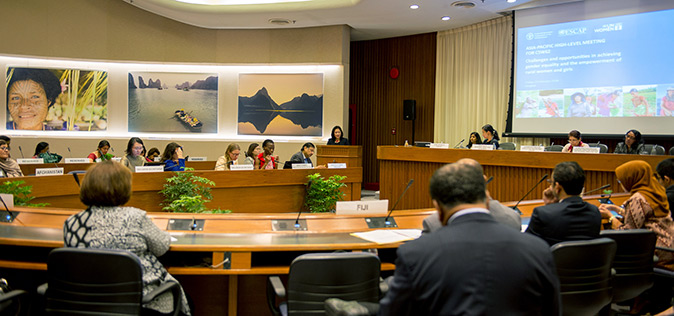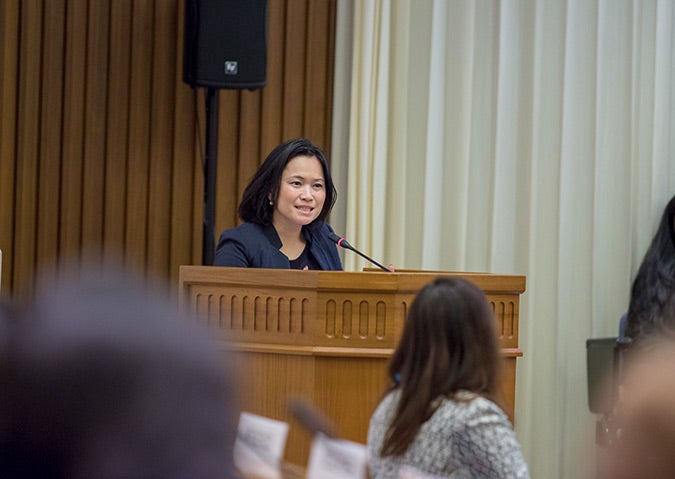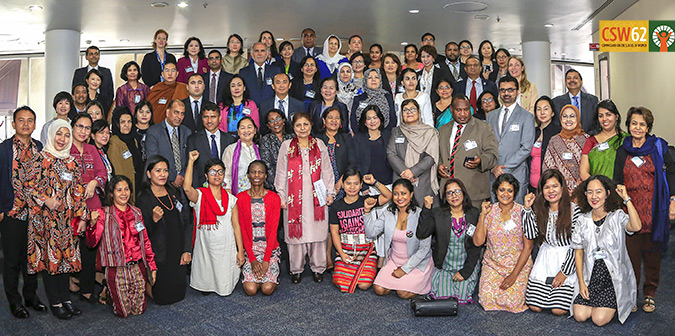Speech: Asia-Pacific High-level Meeting for CSW 62 “Challenges and opportunities in achieving gender equality and the empowerment of rural women and girls”
Date:
Speech by Dr Miwa Kato, Regional Director, UN Women Regional Office for Asia and the Pacific, at United Nations Conference Centre, Bangkok, Thailand.
[As delivered]
On behalf of UN Women, I want to begin by thanking you all for being here in Bangkok to prepare for the 62nd session of the Commission on the Status of Women taking place in New York next month. I wish also to thank our UN partners, ESCAP and FAO in particular, for the partnership in organizing this meeting. And I recognize the World Food Programme for its invaluable technical inputs and preparatory support. Finally, I acknowledge and thank the Asia Pacific Forum on Women Law and Development - APWLD, - for supporting the representation of civil society at this meeting.


As a result of these partnerships, it is fantastic to see the vast gender, rural development and agricultural expertise here in the room today, from government, civil society and the United Nations.
Indeed, it is clear from the broad scope of issues still affecting rural women and girls today, that achieving gender equality needs to be tackled from a wide range of policy angles, in a coordinated manner.
We hope that this meeting supports south-south and cross-sectoral exchange and provides a platform for countries in this Region to jointly reflect on the key recommendations and messages to take forward at the Commission on the Status of Women next month.
As you will all be aware, the priority theme of this years Commission on the Status of Women focuses on rural women and girls: more specifically, addressing the challenges and opportunities in achieving gender equality and their empowerment.
Despite recent urbanization, around 46 per cent of the world's population still lives in rural areas . Both men and women in those communities face economic difficulties, natural disasters and conflict. But all of these hardships affect rural women and girls disproportionately, and require gender responsive action.

Among rural workers, women - and often girls - are overrepresented in less well paid jobs, in poorer conditions. And when they perform the same work as men, they are paid less for it - by up to 40 per cent . Much of their work is in fact not paid at all: women put in more than twice as much unpaid work in domestic labour and care work than men and perform much of the unpaid labour on farms. When natural disasters or the effects of climate change hit, women and girls are often more affected. When men migrate for work, many women are left responsible for running farms but without the status they need to make decisions or fend off land grabs. Faced with a rapidly changing society, increasingly dominated by ICT, women and girls in rural areas are also less likely to receive the education required to access employment.
We must also tackle the injustices that women and girls face in their personal lives. Women and girls will not have equal prospects as long as they are pushed or forced to marry early, or do not have agency over their own health, sexual and reproductive lives.
Violence Against Women and Girls comes at a huge personal cost, but it is today known to have an enormous cost on society and the economy at large. The cost of domestic violence alone is estimated to be between 1.2 and 2 per cent of GDP worldwide.
Amid these complex dynamics, the objective of "Leaving no one behind" requires attention to the multiple and intersecting identities and inequalities that rural women face: as young women and girls, older women, heads of households, indigenous women, women affected by HIV/AIDS, women with disabilities, migrants, refugees and the internally displaced, including those displaced by factors related to climate change. Disaggregated data collection methodologies in support of advancing gender equality and rural women's rights are thus crucial and need to be deepened.
We also need to make sure that policy-makers are able to engage with those with first-hand experience of what is really needed: the rural women themselves. There needs to be a space at the policy-making table for civil society organizations representing the interests of rural women and girls.
Yesterday's Asia Pacific Civil Society Preparatory meeting for CSW 62 held here Bangkok, - with many thanks to APWLD for organizing the meeting - is a good example of how civil society from the region and from different walks of life continue to come together to learn from each other, discuss issues affecting rural women, and prepare to inform policy makers and engage with them in this regard.
Finally, and perhaps most importantly, addressing the challenges of rural women and girls also implies moving beyond treating the symptoms of gender inequality - namely women's unequal access to resources and opportunities - to addressing the underlying causes. This will require us to tackle gender norms and behaviours, power relations and social institutions.
We hope that today will allow us to deliberate on all these issues, and refine the draft set of recommendations prepared for this meeting. The draft recommendations are forward-looking and focus on the "how" to go about addressing the issues highlighted above.
We hope these recommendations will be taken forward by you at national level and at CSW 62 in order to transform the lives of rural women and girls.
I wish you productive deliberations and thank you again.
